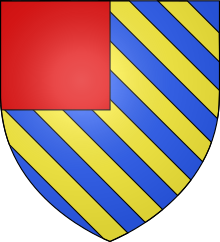Conon de Béthune
Conon de Bethune (German and Kuno of Bethune * in 1150 in Artois ; † 17th December 1219 / 1220 in Adrian Opel or Constantinople Opel ) was a knight and Trouvère .
Conon was born as the 10th son of Robert V , Lord of Béthune, in Artois , then Flanders . He was a cousin of the Trouvères Huon d'Oisi and also a student in its arts. On the part of his grandmother, he was related to the Counts of Hainaut in Flanders . Its appearance at the French royal court around 1180 is therefore probably due to the wedding of the then 10-year-old Isabella von Hainaut with the French King Philip II .
He initially mocked his bad French and his Picardy dialect (he complains about it in a song: ... mon langage ont blâmé les François, et mes canchons oyant les Champenois ... ), followed King Philip II. in the Third Crusade (1189 / 1190–1193), which he had wished for in his famous 1188 crusade song (model for a whole series of poems on this subject). His father died here in 1191 during the siege of Acre .
He took part in the Fourth Crusade as a follower and close confidante of Count Baldwin of Hainaut and Flanders , who rose to become Latin Emperor of Constantinople in the course of the crusade . Conon negotiated ship transport with Venice and, after the conquest of Constantinople, held important offices such as that of governor of Adrianople . After Baldwin's death he was one of the leading figures in the ruling barons of the Latin Empire .
The crusade writers describe him as a spirited, violent, eloquent and proud gentleman; that's what Gottfried von Villehardouin calls him : "Bon chevalier et sage estoit et bien eloquens" .
Works
Conon is considered to be an important mediator of the Minne poetry, which originally came from Provence , in northern France. Ten songs of his poems have been handed down:
- Chançon alloy a entender
- Si voiremant con cele don je chant
- Mout me semont Amors que je m'envoise
- Ahi! Amors, com dure departie
- Bien me deuss targier
- Se raige et derverie
- Belle doce lady chiere
- Tant ai amé c'or me convient haïr
- L'autrier un jor aprés la Saint Denise
- L'autrier avint en cel autre païs
literature
- Alexios G. Savvides, Benjamin Hendrickx (Eds.): Encyclopaedic Prosopographical Lexicon of Byzantine History and Civilization. Vol. 2: Baanes-Eznik of Kolb. Brepols Publishers, Turnhout 2008, ISBN 978-2-503-52377-4 , pp. 225-226.
Web links
- Conon de Béthune's song: Ai! amours, com dure departie ( Memento of May 17, 2008 in the Internet Archive )
- Conon de Béthune's crusader song: Chanson de Croisade ( Memento from October 15, 2013 in the Internet Archive ) []
| personal data | |
|---|---|
| SURNAME | Conon de Béthune |
| ALTERNATIVE NAMES | Conon de Bethune |
| BRIEF DESCRIPTION | Trobador, knight and crusader |
| DATE OF BIRTH | around 1150 |
| DATE OF DEATH | around 1220 |
